Walk becomes walked move becomes moved and so on. The Past Participle is used.
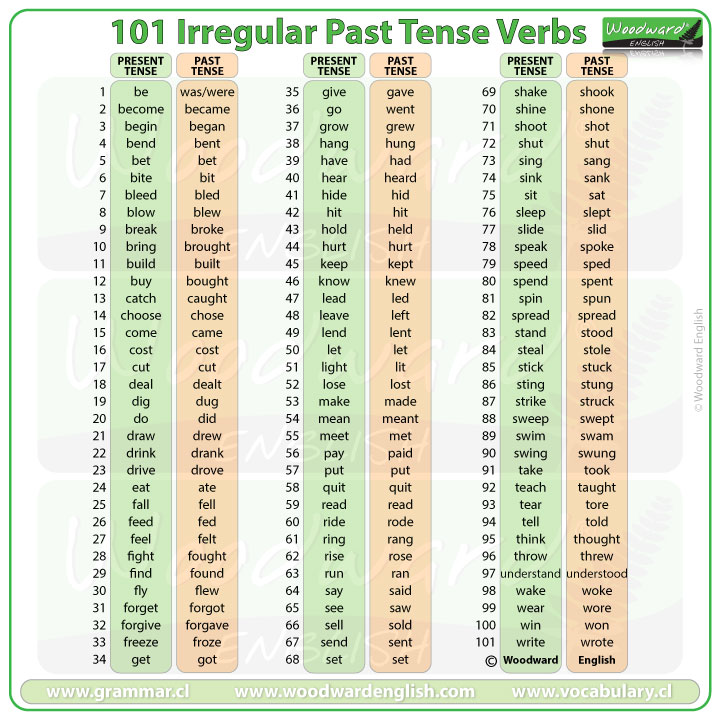
Past Tense Irregular Verbs List English Grammar Verbos Irregulares En Ingles Pasado
Verb Tense Contoh Kalimat Past Participle.
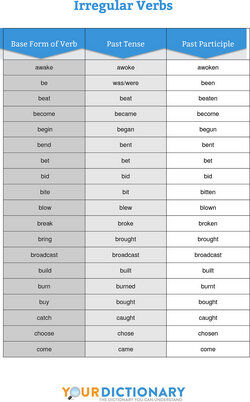
What is a past participle verb. Past participle is defined by the Oxford Dictionary as the form of a verb typically ending in -ed in English which is used in forming perfect and passive tenses and sometimes as an adjective This means that verbs in the past participle form usually end in the letters ed For example the word talked. The past participle form of freeze describes the pond. What does past participle mean.
Past participles form compound verbs with the auxiliary verbs has have and had The auxiliary verb always comes before the past participle. The present participle and the past participle. A past participle most often ends in ed.
Irregular verbs however have various past participle endings for instance thrown ridden built and gone. A compound verb is a combination of two verbs. Past is used for one particular purpose while the past participle is used for another.
The exhausted athlete needed take a break and recharge. Spoken words cannot be revoked. It is the third principal part of a verb created by adding -ed -d or -t to the base form of a regular verb.
You could not say If you had wrote the email earlier they would have gave you a refund. What they both have in common is that both of them affect the verb. The main difference between past participle and past perfect is that past participle is a verb form whereas past perfect is a tense.
There are many irregular verbs with past participles that are often used incorrectly. Some common ones include thinkthought eateaten gogone dodone and feelfelt. Balita-balita itu telah tidur selama satu jam been past participle dari auxiliary be past perfect tense.
Written in the first part or clause of the sentence is a past participle. Commonly Misused Past Participles. Also called perfect participle.
Saya telah membayar tagihan tersebut present perfect continuous tense. However there are a handful of verbs with irregular past participles. Most past participles end in -ed.
The past participles form of regular English verbs is identical to the simple past tense form. Given in the second clause is a past participle. Most past participles end -ed -d -t -en or -n.
Because it is used to express actions that have already happened it takes the past tense form. A participle that typically expresses completed action that is traditionally one of the principal parts of the verb and that is traditionally used in English in the formation of perfect tenses in the active voice and of all tenses in the passive voice. Present participles are also sometimes called gerund participles.
A past participle is a word that can be used as an adjective or to form verb tense. What is a Past Participle. I have paid the bill.
The past participles of all regular verbs end in -ed. Past participles are a nonfinite verb form in English that perform verbal and adjectival functions. This compound tense is formed by adding the past participle to the auxiliary verb had.
This page has lots of examples of past participles shows how to form past participles and has an interactive exercise. A past participle is formed from a verb. Those toddlers have been sleeping for an hour.
Past participles are also referred to as -en participles passive participles and perfect participles. A verb form indicating past or completed action or time that is used as a verbal adjective in phrases such as finished work and baked beans and with auxiliaries to form the passive voice or perfect and pluperfect tenses in constructions such as The work was finished and She had baked the beans. An auxiliary verb also called a helping verb and a participle.
Shes already eaten lunch. The past participle of exhaust describes the athlete. Definition of past participle.
Past participles are classified as non-finite verbs. In English grammar the past participle refers to an action that was started and completed entirely in the past. Most past participles are formed by adding -ed to the base form of a verb or just -d if the verb already ends in -e.
Participles are words formed from verbs that can function as adjectives or gerunds or can be used to form the continuous tenses and the perfect tenses of verbs. In English the verb has three forms. There are two participle forms.
English Detailed Regular Verbs Infinitive Past and Participle Infinitive Past Participle Accept Accepted Accepted Act Acted Acted Achieve Achieved Achieved Admire Admired Admired Advise Advised Advised Affect Affected Affected Agree Agreed Agreed Amaze Amazed Amazed Amuse Amused Amused Answer Answered Answered Appear Appeared Appeared Arrange Arranged Arranged Arrive Arrived Arrived Ask. Past participles are used with simple perfect tenses continuous perfect or progressive perfect tenses take the participle been the present participle - have been playing will have been working etc. Combining Participles with to Be.
Past and Past participle are two grammatical forms that show difference between them in usage. The past perfect tense is used to indicate an action that happened in the past before another action happened. A past participle is formed from a verb and modifies a noun noun phrase verb or verb phrase.
Present past and the past participle. With the auxiliary verb have to form the perfect aspect. For example lets take a look at the past participle kicked.
You must use a past participle in both clauses.

Irregular Verbs Infinitive Past Simple Past Participle Irregular Verbs English Verbs Verbs List
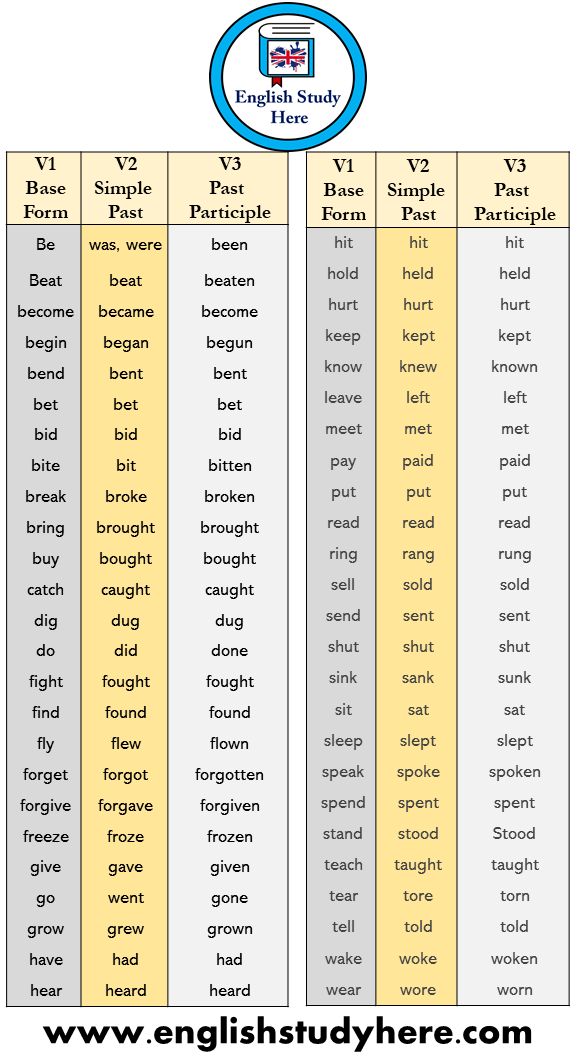
150 V1 Base Form V2 Simple Past V3 Past Participle Verb List English Study Here
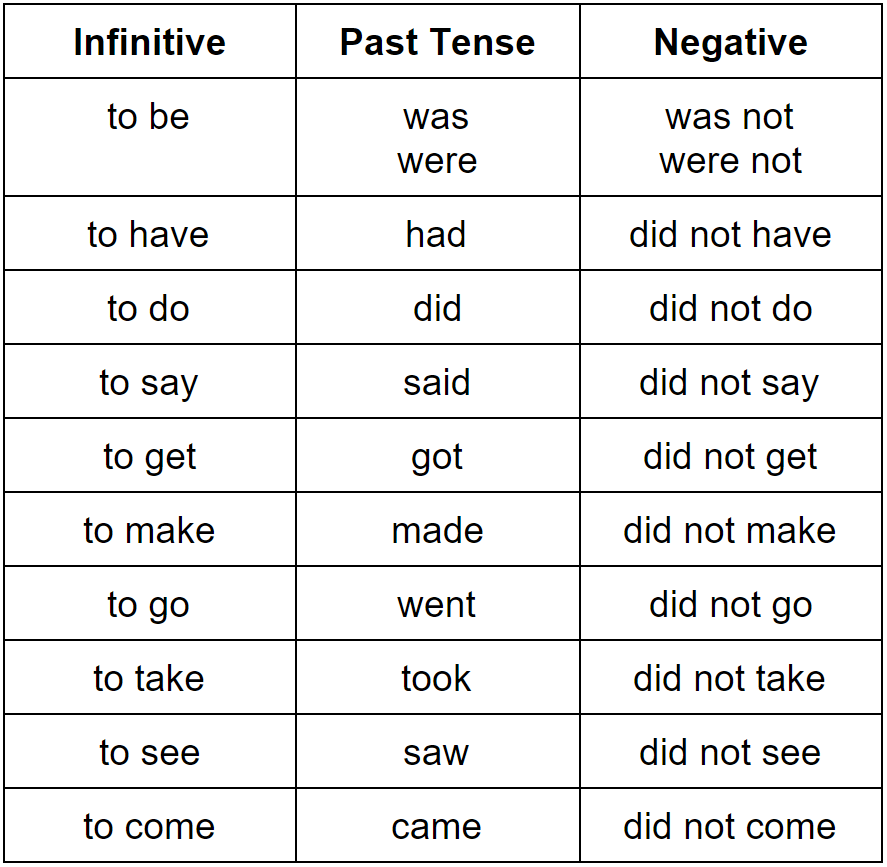
Simple Past Tense Grammar Rules Grammarly
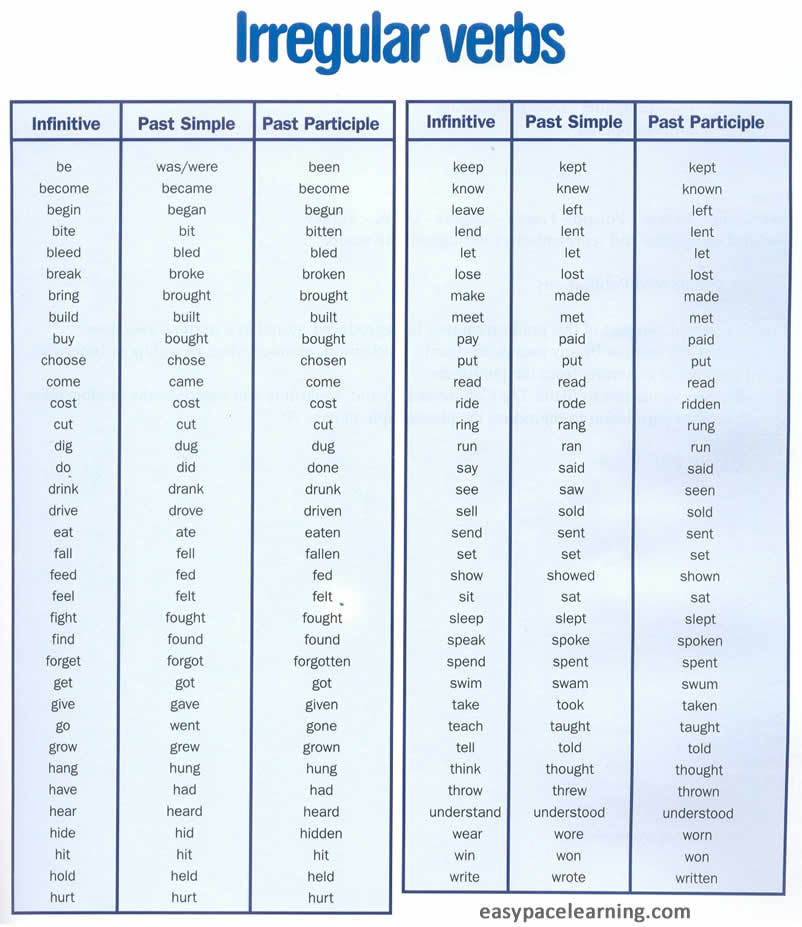
List Of Irregular Verbs In Infinitive Past Simple And Past Participle